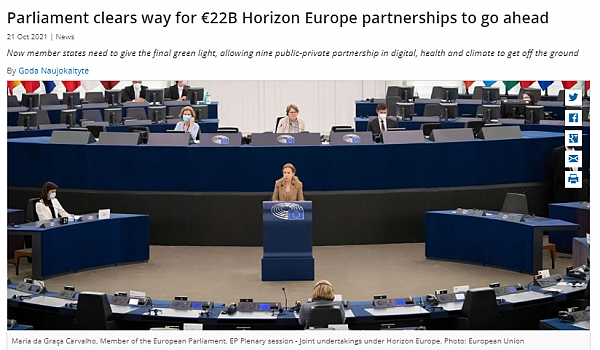Imprensa Parliament clears way for €22B Horizon Europe partnerships to go ahead
The European Parliament has voted through nine public-private partnerships under Horizon Europe, which MEPs hope will shape up to be more accessible for small companies, be less bureaucratic and attract further funding from national and European programmes.
“We were guided by the principles of openness, transparency and inclusiveness, which we want to be cross-cutting right across these partnerships,” said the rapporteur for the file, Maria da Graça Carvalho MEP.
Parliament’s goal is to ensure effective spending of the €22 billion budget for the nine so-called joint undertakings, of which €10 billion will come from the EU research programme, Horizon Europe.
The partnerships will launch a year after the start of Horizon Europe, once the member states give final approval. That is a formality, given they already reached an agreement among themselves in September. Parliament’s opinion is non-binding, but the vote will allow member states to officially adopt the legislation at a Council meeting at the end of November.
Two of the partnerships, the Innovative Health Initiative and Global Health, will cover drug development in Europe and Africa. Another two will support Europe’s green goals in clean hydrogen fuels and a circular bio-based economy. Two will develop smart networks and electronic components to boost the EU’s technology sovereignty. Three will advance developments in clean aviation, rail networks and air traffic control.
Extra funding
“We’ve done all of this not because we doubt the effectiveness of previous public-private partnerships but because we believe this is a key element to achieve our future goals,” said Carvalho. “We want to see a Europe that is better able to face natural disasters, health crises and resource scarcities.”
The vote comes just after the World Health Organisation approved the first malaria vaccine for children in sub-Saharan Africa, developed with inputs from one of the Horizon 2020 partnerships, the European and Developing Countries Clinical Trials Partnership.
Carvalho wants to replicate such successes with the new generation of industrial partnerships, and hopes the partnerships can secure extra funding on top of the €22 billion budget.
The question of synergies with other national and EU initiatives is closely tied to leveraging in more money, but is something Parliament did not succeed in writing into the plan.
As a compromise, the Commission is working on guidelines for the partnerships on how synergies can be implemented. While there’s been a lot of talk, working with different programmes at EU level remains difficult. Carvalho told Science|Business she hopes the guidelines will simplify access to extra funding and €22 billion will be only the base funding for the initiatives.
When the guidelines will be available remains to be seen, but Carvalho said the work is “very advanced.”
Centre-right MEP Angelika Winzig praised the partnerships and suggested their budget could be topped up with EU money that is not absorbed by member states. “Perhaps that money could go to these programmes, which would be good for European competitiveness,” she said.
Others are skeptical. Maximilian Krah from Parliament’s Eurosceptic group Identity and Democracy said innovation could not be created by simply throwing money at companies. “We should let businesses and research institutions simply do their work. Less regulation, less taxation. Less EU, more freedom,” he told MEPs.
More transparency
MEPs want to see the partnerships make meeting minutes, conflicts of interest and other key information influencing their decision-making public.
EU research commissioner Mariya Gabriel promised to deliver on this. “These commitments from the private companies will be published. Following a call from the European Parliament, joint undertakings will have to prove that there is more transparency and they will have to provide more information on their activities,” she said.
Parliament will follow the implementation of these principles, Carvalho said. “If they fulfil what they have written, there will be more transparency. We will be vigilant to make sure they fulfil what they agreed,” Carvalho told Science|Business.
But at the end of the day, Parliament has limited power over the partnerships. It provides an opinion on the joint undertakings, which the member states take into account when making their final decision. “It is a pity that, on such a relevant topic, the European Parliament cannot contribute to the legislative process on an equal footing to the Council," Josianne Cutajar, shadow rapporteur for the file, told Science|Business recently.
Cutajar welcomed the Council’s decision to enhance the gender dimension of research carried out by the partnerships, but said member states could have been more ambitious. "While I think that the Parliament's text embeds many ambitious elements that the Council did not fully take into account, the good news is that an agreement on the joint undertakings will allow a quick kick-off of these public-private partnerships,” Cutajar said.
Parliament will continue monitoring the work of the partnerships, which will play a key role in delivering many of the EU’s green and digital policies. For example, Carvalho says, the package detailing how the EU can achieve its climate targets promises low-carbon aviation will be possible in the coming years. The clean aviation partnership will be instrumental in fulfilling that goal.
One remaining partnership on metrology, the science of measurement, is expected to pass the final vote on 11 November at the Parliament plenary.
